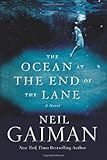 What I love best about Neil Gaiman books is that I know they will touch me and make me laugh, have moments of sparkling philosophy alongside excellent descriptions, and have unforgettable characters and places. His latest novel [amazon_link id=”0062255657″ target=”_blank” ]The Ocean at the End of the Lane[/amazon_link] is no exception. Many critics are calling this novel Gaiman’s finest, and I have to admit I haven’t read him widely enough to agree unequivocally. I will let you know what I think after I’ve read a few more.
What I love best about Neil Gaiman books is that I know they will touch me and make me laugh, have moments of sparkling philosophy alongside excellent descriptions, and have unforgettable characters and places. His latest novel [amazon_link id=”0062255657″ target=”_blank” ]The Ocean at the End of the Lane[/amazon_link] is no exception. Many critics are calling this novel Gaiman’s finest, and I have to admit I haven’t read him widely enough to agree unequivocally. I will let you know what I think after I’ve read a few more.
We meet the narrator in his late 40’s after he has just attended a funeral and has come back to the place where he lived as a seven-year-old boy. Sitting by a duck pond on the Hempstock farm, he suddenly remembers Lettie Hempstock and how she used to call the pond, her “ocean.” As he remembers this detail, he starts to remember the rest of the story—how Something dark and otherworldly was awakened when the opal miner who rented a room in the protagonist’s house stole the family car and committed suicide inside it and everything that came after. Did it really happen?
Childhood memories are sometimes covered and obscured beneath the things that come later, like childhood toys forgotten at the bottom of a crammed adult closet, but they are never lost for good.
The Ocean at the End of the Lane is about a lot of things. It’s about the differences between children and adults. It’s about the fuzziness of memory and what’s really real. It’s about nightmares and other worlds. It’s about sacrifice and loss. It’s about friendship. The NY Times review of the novel says “Gaiman helps us remember the wonder and terror and powerlessness that owned us as children.” I think that is an apt assessment, and I think somewhere inside, we all remember those feelings of wonder, terror, and powerlessness. My favorite thing this book is about, however, is books. Gaiman’s protagonist, whom I cannot recall was ever named, is a lover of books, and he makes some very astute observations about them, this observation being my favorite:
I liked myths. They weren’t adult stories and they weren’t children’s stories. They were better than that. They just were.
Adult stories never made sense, and they were so slow to start. They made me feel like there were secrets, Masonic, mythic secrets, to adulthood. Why didn’t adults want to read about Narnia, about secret islands and smugglers and dangerous fairies?
He makes this observation after he describes retreating into books to escape his fear. “I was not scared of anything when I read my book.” Since I was the kind of child who read constantly, and since I’m the kind of adult who loves myths, too (including the odd dangerous fairy), I found myself in the seven-year-old protagonist of this novel.
Neil Gaiman has a gift with language. He weaves beautiful sentences together, and I always find myself highlighting more when I read his books than I typically do. He also knows how to create villains right out of your nightmares. But after reading [amazon_link id=”0380807343″ target=”_blank” ]Coraline[/amazon_link], [amazon_link id=”0060530944″ target=”_blank” ]The Graveyard Book[/amazon_link], and now The Ocean at the End of the Lane, I think what Gaiman is best at is capturing that feeling of what it is like to be a child and to be a child who is scared and alone.
Rating:




Aw, this book. I started reading it to my sister yesterday — just like old times! — and I love how well it captures the way kids think. Like the things that are important to kids as compared to adults.